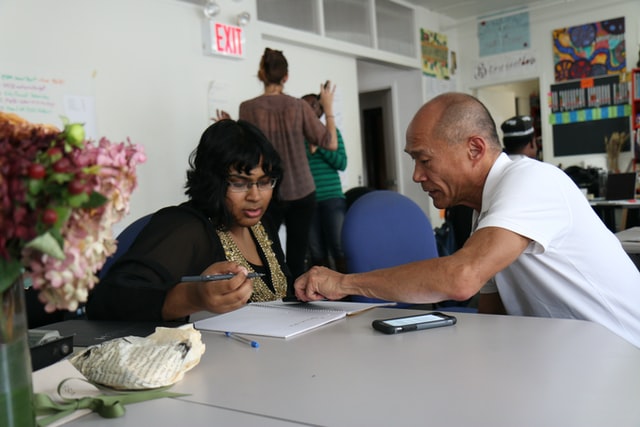Faculty and Staff Resources
If you encounter a student in crisis with immediate safety risks, ask your student to go to the nearest emergency department of their closest hospital. If your student declines and you continue to be concerned about their safety, call 9-1-1, then call security (416-979-5040) to either notify them (i.e., if person is off campus) or let them know to do a police escort (i.e. if on campus).

Often, faculty, teaching assistants and staff are the first to recognize that a student may be in distress and in need of support. Many students turn to you for advice as a first point of contact, as they know and respect you. While your role as faculty or staff does not include providing personal counseling to the student, it can help to know how best to be a support.
For further information on how to refer and how best to support a student in distress, review the “Notice, Engage, Refer + Debrief Guideline”, a guide that outlines what kinds of distress you may notice, how to engage a student in distress, and detailed steps for referrals.
When to refer
A referral to the CSDC may be indicated: if you are feeling anxious, if you don’t know what you can do for the student, if you recognize that your support is no longer adequate, or if you find that the responsibility you have assumed is weighing too heavily on you.
What to Do
Listen. Take the student seriously. Show concern. Set clear limits. Consult with others. Refer the student.
What Not to Do
Don’t take on too much responsibility. Don’t deal with a crisis alone.
What to Say
Consider saying “You seem to be pretty upset about this and I think you could use some help in sorting out these issues. I’m concerned about you and I would like you to consider talking to one of our counsellors in our Centre for Student Development and Counselling”.
Urgent Referrals
If your student requires urgent support and is not in immediate crisis with safety risks, please encourage them to contact the CSDC between 9am-5pm Monday-Friday, or direct them to contact Good2Talk (external link, opens in new window) for 24/7 support.
If you are unsure about how to support a student in distress, please contact the CSDC between 9am-5pm or Good2Talk (external link, opens in new window) outside of office hours for consultative support.
Contact for the CSDC: 416-979-5195 or csdc@torontomu.ca. Messages are being monitored regularly during business hours, and our front desk staff will respond as soon as possible.

Behavioural Changes
- Repeated absences from class
- Missed assignments/exams/appointments
- Repeated requests for special accommodation (e.g., extensions on assignments)
- Themes in creative work which reflect despair, hopelessness, isolation, violence, or rage
- Disorganized or erratic performance
- Direct statements indicating a personal or family problem
Physical Changes
- Unkempt appearance with a lack of personal hygiene
- Appearance of excessive fatigue, lack of sleep
- Indications of substance abuse (e.g., smelling alcohol or marijuana)
Personality Changes
- Sudden change in attitude (e.g., withdrawal, becoming unusually quiet, exhibiting unprovoked anger or hostility)
- Anxiety
- Ongoing expressions of sadness or tearfulness
Safety-risk Behaviours
- Appearing depressed or withdrawn
- Expressions of despair, hopelessness, helplessness
- Giving away prized possessions
- Self-injurious behaviours (e.g., cutting)
- Threats against others
- Poor impulse control
- Any written note, artwork, or verbal statement which has a sense of finality or suicidality to it
Other Changes
- Bereavement (death of significant person) or loss (ending of relationship, failure in class)
- Other students or peers expressing concern for the student
- Your own sense that something is wrong
The presence of one indicator alone does not necessarily mean that the student is in distress. However, that is not always the case. It is always important to check on your concerns. That said, the more indicators that are present, the greater the likelihood that the student would benefit from a referral to a personal counsellor.

Make Contact
- Talk with the student in person
- Stay calm and express your concern for the student
- Listen carefully
- Take the student seriously
- Use supportive communication
Supportive Communication
Do
- Be patient, give the student the opportunity to talk
- Let the student know you are listening via your verbal and non-verbal responses
- Set aside your biases
- Be non-judgemental
- Determine what the student needs from you
Don't
- Minimize the student's feelings
- Express disapproval of the student's thoughts or feelings
- Ask "why" questions
- Be defensive or personalize what the student is saying
Be aware of your role and responsibilities
- Be responsive while maintaining boundaries
- Be aware of your own limitations
- Seek consultative support from the CSDC M-F, 9am-5pm, or Good2Talk (external link) outside of regular business hours
What to Say
Consider saying “I’m glad you reached out. I can see you are upset and want to ensure you get the support you are looking for. Here are some resources that I believe will be helpful - I really encourage you to use them.”
If the referral is rejected, do not take it personally. Listen to the student's concerns about seeking help. Normalize the referral process, making it clear that your wanting the student to see a counsellor does not mean that you think that there is something wrong with the student. Emphasize that counselling support at the university is free and easy to access. Keep the lines of communication open.
The Student Care Office works with the Toronto Metropolitan community to identify students in distress, address disruptive student behaviour and help students who are dealing with challenging personal, academic and/or financial issues. Support and consultation are available for students, staff, and faculty.
We also partner with the following offices on campus in building a safer community for all:
Consider Safety
- Any reference to ending one’s life or threat of violence must be taken seriously
- Call 911 if suicide/harm is already in progress or if there is imminent safety risks to the individual or community
- If you are unsure about the level of safety/risk, call security (416-979-5040) after hours and on weekends, or contact Good2Talk (external link) for 24/7 consultative support.
- Contact the Centre for Student Development and Counselling (csdc@torontomu.ca) weekdays between 9 AM-4:45 PM.
Refer when it’s FAIR
Refer out if/and when these 4 conditions apply. They are signals that more support is needed.
- FEAR… if you feel afraid of or for the community member
- ANGER… if you feel angry - take a step back
- IGNORANCE… if you don’t know what more you can do for the person
- RESPONSIBILITY and RESENTMENT… if you find that you begin to resent the responsibility you have assumed for the person
Emphasize key points:
- State what you notice
- State the concern/reason
- Offer a resource
- Always be empathic and non-judgmental.
- Provide the person with tools to develop their own network of support
Setting boundaries and referring in concerning situations
- Sometimes we get into situations that are outside of our expertise and we may feel the person needs more support than you can provide. It is ok to own that and recognize it. It is in the best interest of the individual involved.
- In this instance, it is important that we provide the individual the opportunity to get the appropriate support – either from a family member, GP, or it could be a counsellor or a support staff on campus.
- What to say if you are concerned: “What I hear you describing is outside of my scope/expertise and I want to ensure you get the support you are looking for. Here are some resources/phone numbers/I will stay on the call with you while you connect...”
- What to say to someone when you are worried for their safety: “I’m worried about your safety and I will be calling one of these resources to get you connected with support.”
Setting boundaries and referring in urgent situations
- What to say of when you think the situation is urgent or that the person needs immediate help: “You seem to be very upset and I am concerned about you and want to ensure you get some help. Can I make a call to one of the resources on your behalf or would you like to call?”
- Notice the difference in urgent situations is that someone is calling before the interaction is over.